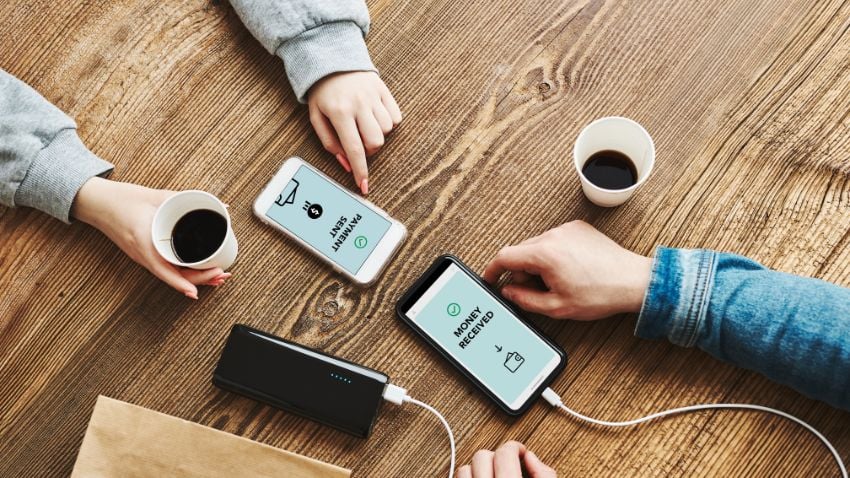Best Cities To Live In Mexico In 2026
Mexico remains one of Latin America’s most compelling destinations, especially for North Americans. More than a million expats call it home, and tens...

8 min read
Banking is perhaps one of the most complex parts of being an expat. After multiple years of using your home country’s banking system, you might have learned just enough to send and receive money.
However, when you want to become an expat and have a solid international strategy, you need to go beyond and learn more terms that, more often than not, seem quite difficult to grasp.
What is an IBAN?
What are ACH transfers?
What is a BIC used for?
The banking jargon can be intimidating, but this article will break it down to facilitate future overseas transactions.
That dream of yours, whether buying a beachfront property in Brazil or depositing money in a Panamanian bank account to get a residency and everything in between, will require you to be familiar with banking.
Let’s begin.

The IBAN will have a specific length and structure depending on the country
IBAN is an acronym that stands for International Bank Account Number. Although countries like the US and Canada have not adopted this structure, it’s indeed common in Europe and other parts of the world. An IBAN is a unique identifier that helps in processing international payments. Banks use IBAN to check whether transaction details are correct, minimizing the risk of errors in global transactions.
An IBAN typically contains up to 34 alphanumeric characters, such as a country code, two check digits and a long bank account number. The IBAN will have a specific length and structure depending on the country. For example, an IBAN in Spain starts with ‘ES’ followed by 22 digits, whereas an IBAN in Belgium starts with ‘BE’ followed by 14 digits.
Imagine you’re a German expat living in Uruguay and want to send money to your family back home. In this case, the German IBAN is crucial, as you will ensure the funds are deposited into your family’s account without any hitches.
Canada identifies banks and their branches differently from systems like IBAN or ABA numbers used in other countries. Canadian banks use two main identifiers: Institution Numbers and Transit Numbers.
An institution number is a unique three-digit code assigned to each bank in Canada. This number helps identify the specific financial institution involved in a transaction. For example, the institution number for a major Canadian bank like the Royal Bank of Canada (RBC) is 003.
A transit number is a five-digit code that identifies a specific branch of a Canadian bank. This number, combined with the institution number, ensures that funds are routed to the correct location within the financial institution.
When sending money to a Canadian bank account, you'll need both the transit number and the institution number to ensure the funds are deposited into the correct account.

An ABA Number is a 9-digit code in the US that identifies financial institutions, while other countries use terms like sort code, BIC and SWIFT for the same purpose
The ABA Transit Number, commonly known as the ABA Number, is a unique code used in the US banking system to distinguish between financial institutions. This 9-digit code is a crucial component in processing checks and electronic transactions in the US, ensuring payments are routed to the correct bank and branch efficiently and error-free.
An ABA Number is a 9-digit numerical code. The first two digits refer to the type of financial institution, digits 3 and 4 indicate the Federal Reserve Bank district branch, digits 5 to 8 mean the name of the financial institution that holds the account, and finally, digit 9 is the single check digit. In the UK and Ireland, there’s a similar term called “sort code,” whereas in other countries, the terms BIC and SWIFT are often used.
For instance, you need the ABA number when directing payments, such as utilities or rent, to the right bank. Also, companies that must set up a direct salary deposit into a US bank account need the ABA number to ensure the funds arrive at the correct bank. If you operate in the US banking system as an expat or a resident, you need to know about ABAs to function smoothly.

The BIC and SWIFT codes are essential in cross-border transactions, helping ensure funds reach the correct bank and branch when sending money internationally
BIC is an acronym that stands for Business Identifier Code. It is a format used worldwide to identify banks and financial institutions. In particular, a BIC determines the beneficiary bank of a transfer (or destination bank), making it a crucial part of international transactions. SWIFT is an acronym that stands for Society for Worldwide Interbank Financial Telecommunications. This organization is, therefore, in charge of making transfers between financial institutions easier.
A BIC is often 8 or 11 characters long, showcasing the bank, country, province (or city) and branch. For instance, Bank of America’s BIC would look like BOFAUS3NXXX, where BOF refers to the institution itself, US to the country, and 3N to the location. The last three digits vary from branch to branch.
BIC and SWIFT can be used interchangeably, so a SWIFT code has 8 or 11 characters. SWIFT’s structure is exactly like BIC’s. The difference between these two concepts is that BIC is just a code, whereas SWIFT is the organization that registers and regulates these codes.
When performing cross-border transactions, the BIC is used alongside the IBAN to send funds to the right bank and branch. For example, let’s say you’re sending money from your Canadian bank account to a friend’s account in France. Then, you’d need the French bank’s BIC to deposit the funds in the correct entity. Now, imagine you’re American and want to purchase a property in Panama. In this case, your American bank would need your Panamanian bank’s SWIFT code to route the money correctly. Click here to look up SWIFT codes across multiple countries.

American expats in Colombia can use ACH for remote rental property management in the US, while SEPA and EFT offer cost-effective international transfer options
ACH is an acronym that stands for Automated Clearing House. It’s a network employed to move money between bank accounts electronically in the US. It is run by a self-regulating organization called NACHA (National Automated Clearinghouse Association), which maintains the infrastructure that makes these possible. As of the time of writing, the ACH network has over 10,000 financial institutions in the US. There are similar systems in other dollarized economies like Panama and Ecuador.
You might have heard the words ‘wire transfer’ multiple times. It is synonymous with ‘electronic funds transfer,’ which involves sending money from one bank account to another. While wire transfers are often used for large international transactions (including those involving currency exchanges), ACH is better suited for smaller, domestic payments. We’ll further discuss wire transfers later in this article.
Imagine you’re an American expat with rental properties in the US, yet you live in Colombia. Even if you’re abroad, the ACH technology facilitates managing your rentals, including direct debits, setting up automatic bill payments and receiving tax refunds. Note that international ACH transfers exist; these are cost-effective because you just need to pay a small fee, but they’re slower. Other ACH equivalents are SEPA (Single Euro Payments Area) in Europe and EFT (Electronic Funds Transfer) in Canada.

SEPA simplifies European financial transactions, offering faster, cheaper payments with a consistent process for all Euro transactions within the SEPA zone, facilitating smoother trade and commerce across European borders
Sort codes are special six-digit numbers used in the UK and Ireland to guide money transfers between banks, ensuring the cash flows smoothly to the correct branch. These codes break down who's who in the banking world, from the big players to individual branches.
While the UK still relies on sort codes to manage money moving around inside the country and to identify accounts, Ireland has moved on. As one of the founding members of the Euro, Ireland has adopted the Single European Payment Area (SEPA) systems, saying goodbye to sort codes for a more streamlined European approach.
In Northern Ireland, sort codes starting with '9' are still in play, registered under both the British and the former Irish systems. Typically shown as three pairs of numbers like 12-34-56, these codes not only pinpoint the bank but also the specific branch holding the account. While these codes find their way into International Bank Account Numbers (IBANs), they're not part of Business Identifier Codes (BICs).
In the Eurozone, only IBAN numbers are necessary for bank transfers. However, for transactions involving countries outside the Eurozone, like the United Kingdom, the United States, and Australia, the process taps into international networks. These transactions require either an IBAN or a combination of a domestic account number and a sorting/routing code, along with a BIC code, to identify the institutions involved in sending and receiving payments. For British and Irish IBANs, the bank account sort code is located in characters 9 to 14.
The Single Euro Payments Area, SEPA for short, is a set of European countries (all 27 EU states plus other European states such as the UK, Andorra and more) where citizens and enterprises can perform cross-border transactions regardless of the state where the payments were processed. The primary goal of SEPA is to improve financial efficiency and facilitate money transfers across Europe.
For European residents, SEPA simplifies financial transactions, making them faster and cheaper. Businesses benefit from streamlined operations because the payment process remains the same for all Euro transactions within the SEPA zone, regardless of the country of origin or destination. This system allows for more straightforward trade and commerce across European borders.
Imagine you receive a salary in a French account from an employer in Germany or transfer rent payments from a German account to a landlord in Spain. SEPA ensures these transactions are carried out swiftly and incur minimal if any, extra costs. This system helps automate bill payments and direct deposits across borders, acting as a cornerstone for expats operating in various European countries. SEPA is crucial for business transactions with European clients and suppliers without the common issues associated with currency exchange and hefty fees.

Wire transfers are electronic fund transfers between banks used for large time-sensitive transactions
Wire transfers are the electronic transfer of funds between banks or carried out between banks or via transfer houses, whether nationally or internationally. They are often used for large transactions, such as purchasing a house, where speed and reliability are crucial. For smaller amounts, you might opt for peer-to-peer apps such as Venmo, PayPal or Wise.
The positives of wire transfers are numerous, as they are secure, convenient and quick, usually taking around two business days and allowing for large sums. However, the negatives are fees for both the sender and receiver and the inability to cancel or reverse the transaction.
The biggest concern for expats using wire transfers is the high fees legacy banks often charge and the time it takes to move money from bank A to bank B. Perhaps you want to send thousands or even millions of dollars to a foreign bank account, but once you wire the money, it feels like it is gone; plus, you might pay high fees and stand poor currency conversions. To minimize these common issues, I strongly recommend using our currency transfer partner, who will help you carry out wire transfers securely and quickly with bank-beating exchange rates.
Beneficiary Bank: This is the endpoint in a money transfer process where the funds are finally deposited. In other words, it’s the financial institution where the recipient’s account is held;
Intermediate Bank (or Correspondent Bank): As its name suggests, it’s a mediator in transactions where sending money between two specific banks is not possible. This situation occurs in transactions involving smaller banks or even banks in less connected regions.
Related content: 2023 Banking Meltdown: The Year Of Unprecedented Financial Collapses

Don't be intimidated by banking jargon. Understand IBAN, ABA, BIC, SWIFT, ACH, SEPA, and wire transfers to simplify international transactions and manage finances effectively
Since banking might get tricky sometimes, I wanted to write this article so you can go back to it whenever you have any questions. We’ve covered essential terms like IBAN, BIC, SWIFT, ACH and more, and each of them has its importance when performing money transfers. Understanding the practical implications of this jargon will help you transfer funds across countries and manage your finances as an expat.
A solid international strategy involves familiarity and confidence with how banks operate. Not only will this knowledge simplify your transactions, but it will also protect you from common pitfalls in international finance.
IBAN (International Bank Account Number): A unique identifier that aids in processing international payments and ensuring correct transaction details. It typically contains up to 34 alphanumeric characters, including a country code and a bank account number, varying by country;
ABA (American Banker's Association) Number: A unique 9-digit code used in the US banking system to distinguish financial institutions. This number is vital for conducting smooth domestic financial transactions on American soil;
BIC (Business Identifier Code): A format used worldwide to identify banks and financial institutions, especially crucial in international transactions. It often comprises 8 or 11 characters, representing the bank, country, and specific branch;
SWIFT (Society for Worldwide Interbank Financial Telecommunications): An organization that facilitates transfers between financial institutions. SWIFT codes, used interchangeably with BIC, consist of 8 or 11 characters and serve the same purpose as BIC in identifying banks in international transactions;
ACH (Automated Clearing House): A network used for electronically moving money between bank accounts in the US, managed by NACHA (National Automated Clearinghouse Association). Suited for domestic, smaller, or regular payments and characterized by cost-effectiveness and efficiency;
Wire Transfer: An electronic transfer of funds between banks, used nationally or internationally. Ideal for large transactions due to their speed and security, wire transfers can incur higher fees and are challenging to cancel or reverse once initiated.
If you want the best intel from the expat world, including profitable offshore opportunities, little-known tax-saving strategies, and hard-won insights on immigration, passports, and Plan-B residencies, all delivered to your inbox every single week, then join our daily correspondence, EMS Pulse®. Currently enjoyed by over 84,000 expats and expat-hopefuls worldwide. Fill in the form below to join our newsletter free:

Written by Mikkel Thorup
Mikkel Thorup is the world’s most sought-after expat consultant. He focuses on helping high-net-worth private clients to legally mitigate tax liabilities, obtain a second residency and citizenship, and assemble a portfolio of foreign investments including international real estate, timber plantations, agricultural land and other hard-money tangible assets. Mikkel is the Founder and CEO at Expat Money®, a private consulting firm started in 2017. He hosts the popular weekly podcast, the Expat Money Show, and wrote the definitive #1-Best Selling book Expat Secrets - How To Pay Zero Taxes, Live Overseas And Make Giant Piles Of Money, and his second book: Expats Guide On Moving To Mexico.

Mexico remains one of Latin America’s most compelling destinations, especially for North Americans. More than a million expats call it home, and tens...

South Korea is far more than K-pop and K-dramas. It is a country known for outstanding food, from bustling street markets to high-end dining, as well...

Asia is one of the most fascinating regions in the world for travel, offering an extraordinary mix of cultures, histories, and landscapes. From...